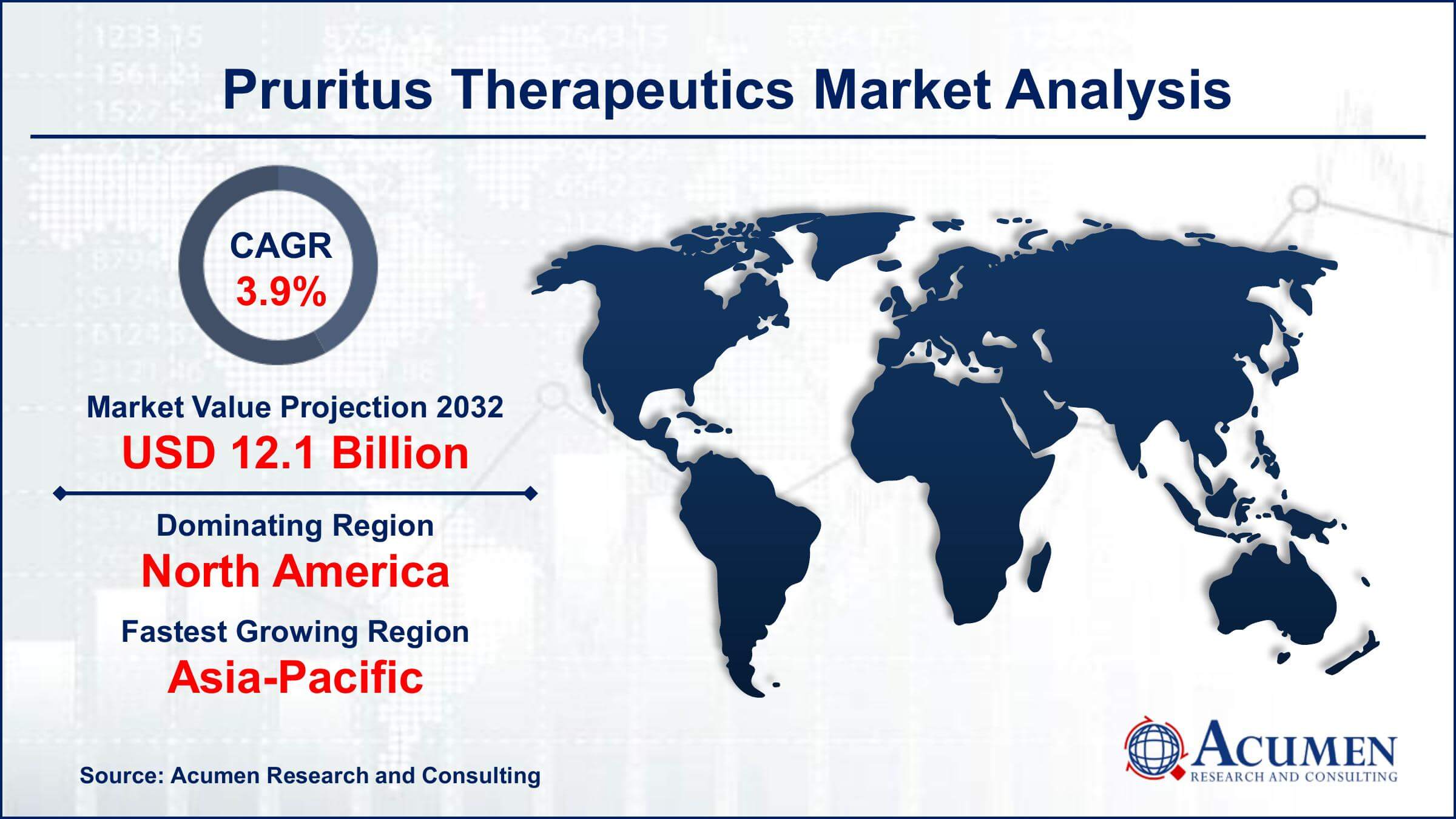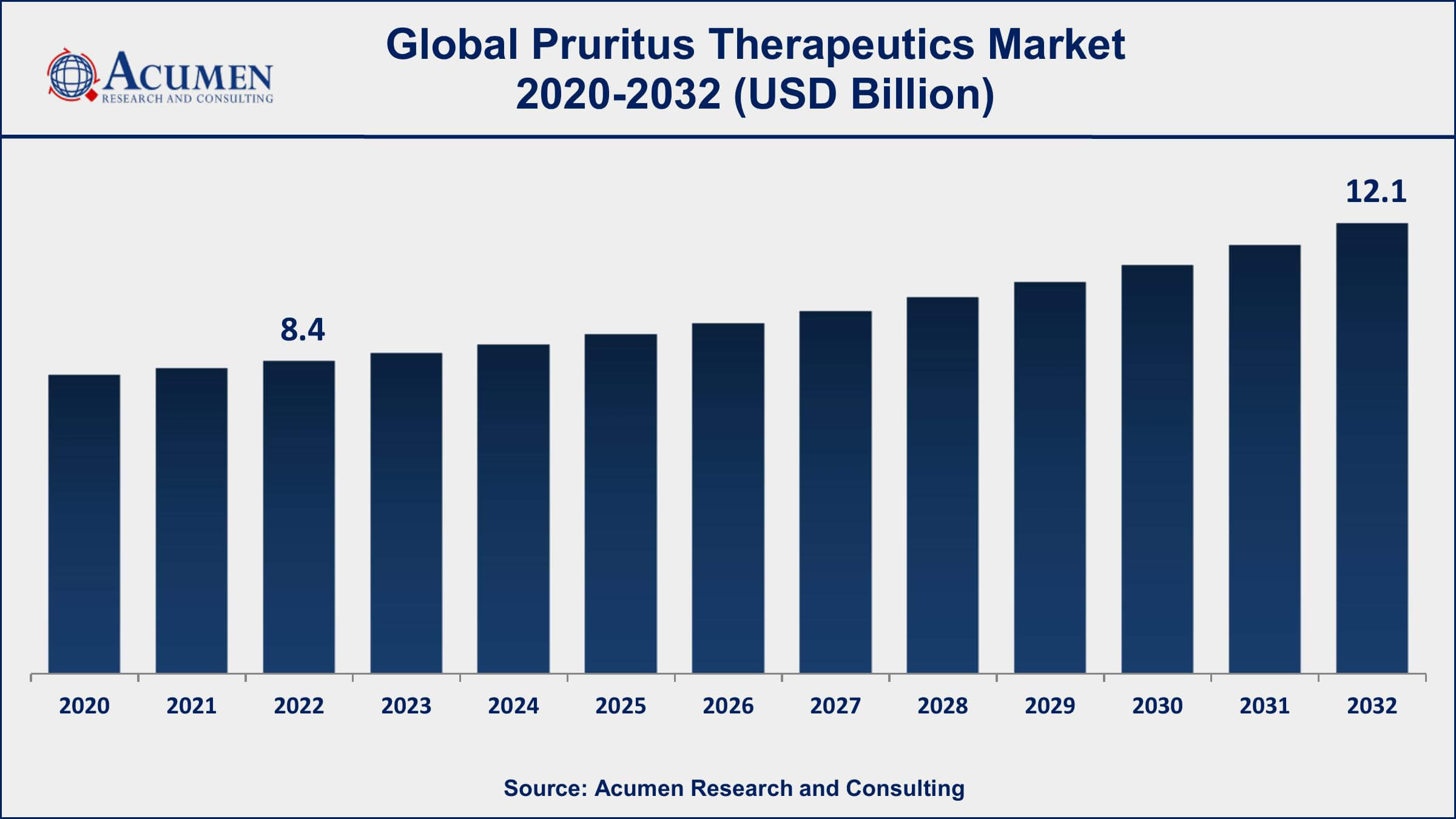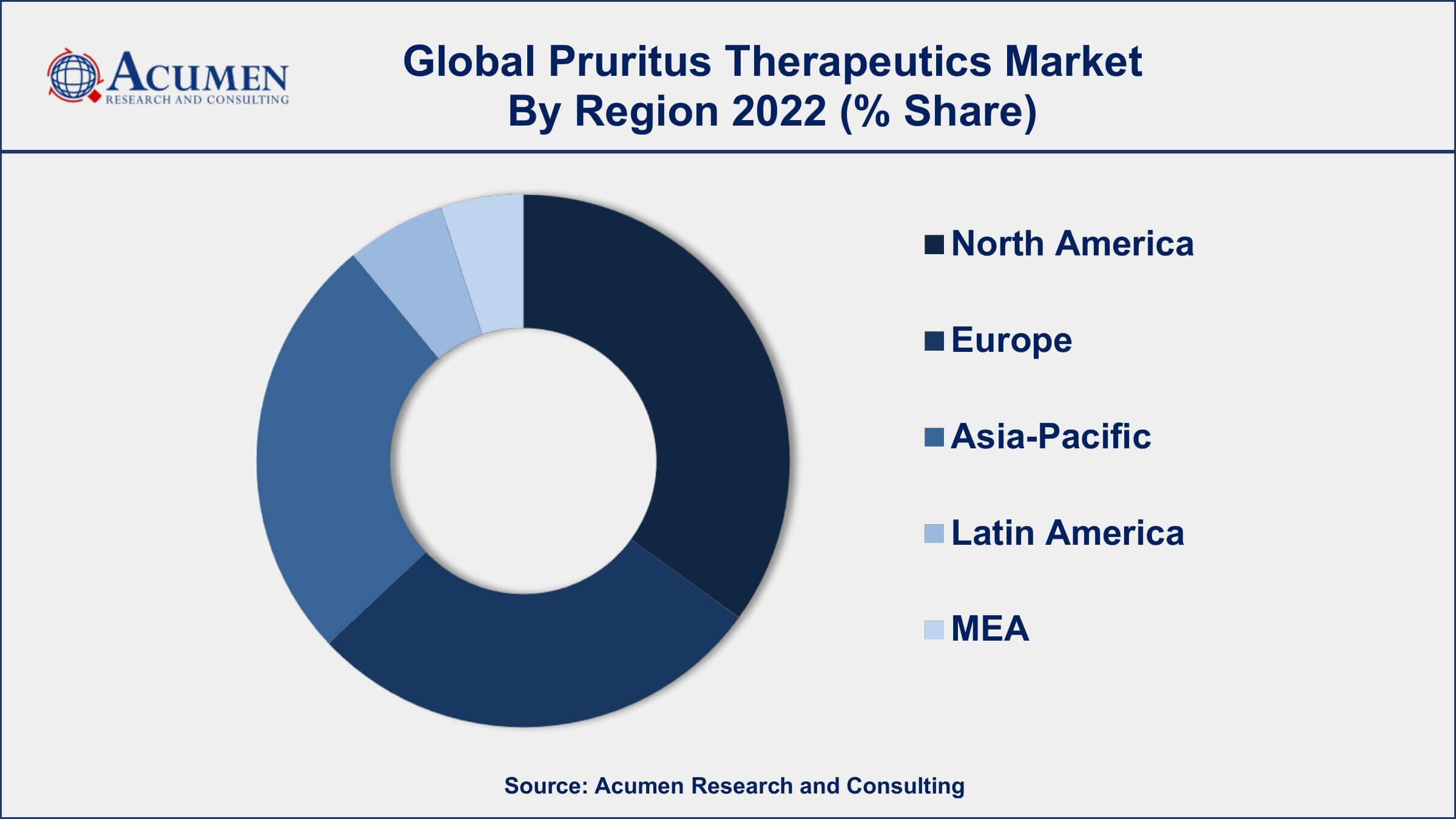Pruritus Therapeutics Market Size - Global Industry, Share, Analysis, Trends and Forecast 2023 - 2032
Published :
Report ID:
Pages :
Format :
Pruritus Therapeutics Market Size - Global Industry, Share, Analysis, Trends and Forecast 2023 - 2032
Report Coverage
- Industry Dynamics
- Market Size and Forecast Data
- Segment Analysis
- Competitive Landscape
- Regional Analysis with a Niche Focus on Country-Level Data
- High Level Analysis - Porter's, PESTEL, Value Chain, etc.
- Company Profiles of Key Players
- Option to Customize the Report As Per Your Specific Need
Request Sample Report
The Global Pruritus Therapeutics Market Size accounted for USD 8.4 Billion in 2022 and is projected to achieve a market size of USD 12.1 Billion by 2032 growing at a CAGR of 3.9% from 2023 to 2032.
Pruritus Therapeutics Market Highlights
- Global Pruritus Therapeutics Market revenue is expected to increase by USD 12.1Billion by 2032, with a 3.9% CAGR from 2023 to 2032
- North America region led with more than 40% of Pruritus Therapeutics Market share in 2022
- Asia-Pacific Pruritus Therapeutics Market growth will record a CAGR of around 4.5% from 2023 to 2032
- By disease type, the atopic dermatitis is the largest segment of the market, accounting for over 31% of the global market share
- By product, the corticosteroids is one of the largest and fastest-growing segments of the pruritus therapeutics industry
- Increasing prevalence of chronic skin conditions and systemic diseases, drives the Pruritus Therapeutics Market value

Pruritus, commonly known as itching, is a distressing symptom that can arise from a variety of underlying medical conditions, including skin disorders, systemic diseases, and certain medications. Pruritus therapeutics refer to treatments and medications developed to alleviate and manage this uncomfortable sensation. These therapeutics aim to provide relief to patients suffering from itching, which can significantly impact their quality of life and overall well-being.
The market for pruritus therapeutics has witnessed steady growth in recent years, driven by several factors. One key factor is the increasing prevalence of chronic skin conditions and systemic diseases associated with pruritus, such as eczema, psoriasis, chronic kidney disease, and liver disorders. As these conditions become more common, the demand for effective pruritus therapeutics has risen. Additionally, advancements in pharmaceutical research and development have led to the introduction of new and more targeted therapies for pruritus, further driving market expansion. The aging population is another contributing factor, as elderly individuals often experience pruritus as a result of age-related skin changes and comorbidities.

Global Pruritus Therapeutics Market Trends
Market Drivers
- Increasing prevalence of chronic skin conditions and systemic diseases
- Advancements in pharmaceutical R&D leading to innovative therapies
- Aging population experiencing age-related pruritus
- Growing awareness and demand for pruritus relief
- Rising healthcare expenditure and insurance coverage
Market Restraints
- Stringent regulatory approvals for new therapeutics
- Potential side effects and safety concerns of certain treatments
Market Opportunities
- Development of targeted and personalized pruritus treatments
- Integration of digital health technologies for patient management
Pruritus Therapeutics Market Report Coverage
| Market | Pruritus Therapeutics Market |
| Pruritus Therapeutics Market Size 2022 | USD 8.4 Billion |
| Pruritus Therapeutics Market Forecast 2032 | USD 12.1 Billion |
| Pruritus Therapeutics Market CAGR During 2023 - 2032 | 3.9% |
| Pruritus Therapeutics Market Analysis Period | 2020 - 2032 |
| Pruritus Therapeutics Market Base Year |
2022 |
| Pruritus Therapeutics Market Forecast Data | 2023 - 2032 |
| Segments Covered | By Disease Type, By Product, And By Geography |
| Regional Scope | North America, Europe, Asia Pacific, Latin America, and Middle East & Africa |
| Key Companies Profiled | Novartis AG, Pfizer Inc., Sanofi S.A., GlaxoSmithKline plc, Johnson & Johnson, Merck & Co., Inc., Eli Lilly and Company, Teva Pharmaceutical Industries Ltd., AstraZeneca plc, AbbVie Inc., Bayer AG, and Allergan plc. |
| Report Coverage |
Market Trends, Drivers, Restraints, Competitive Analysis, Player Profiling, Covid-19 Analysis, Regulation Analysis |
Pruritus therapeutics refers to the various treatment approaches and medications developed to alleviate and manage pruritus, commonly known as itching. Pruritus is not a standalone condition but rather a symptom that can be caused by numerous underlying factors, including skin disorders, systemic diseases, medications, and more. The goal of pruritus therapeutics is to provide relief to individuals experiencing itching, which can range from mild discomfort to severe and debilitating symptoms. These therapeutics can take the form of topical creams, oral medications, injectable drugs, or even lifestyle and environmental modifications to address the root causes of itching.
The application of pruritus therapeutics is multifaceted and depends on the underlying cause of the itching. In dermatology, topical corticosteroids and antihistamines are commonly prescribed to treat pruritus associated with skin conditions like eczema, psoriasis, or insect bites. For systemic diseases such as chronic kidney disease or liver disorders, addressing the underlying medical condition often provides relief from pruritus. Additionally, advancements in pharmaceutical research have led to the development of targeted therapies and biologics that aim to specifically address the mechanisms of pruritus in various conditions. These treatments offer hope for patients who may have previously struggled with unmanageable itching, improving their overall quality of life.
The pruritus therapeutics market has been witnessing steady growth in recent years, driven by a combination of factors that reflect the increasing demand for effective treatments to alleviate itching. One of the primary drivers of this growth is the rising prevalence of chronic skin conditions and systemic diseases associated with pruritus. Conditions like eczema, psoriasis, chronic kidney disease, and liver disorders have become more common, leading to a larger patient pool in need of relief from itching. As a result, pharmaceutical companies and researchers are investing in the development of novel therapies to address these unmet medical needs, propelling market expansion. Another significant driver is the continuous advancement in pharmaceutical research and development, which has led to the introduction of new and more targeted therapies for pruritus.
Pruritus Therapeutics Market Segmentation
The global Pruritus Therapeutics Market segmentation is based on disease type, product, and geography.
Pruritus Therapeutics Market By Disease Type
- Atopic Dermatitis
- Urticaria
- Allergic Contact Dermatitis
- Others
In terms of disease types, the atopic dermatitis segment accounted for the largest market share in 2022. Atopic dermatitis, also known as eczema, is a chronic inflammatory skin condition characterized by itching, redness, and dryness. It affects a substantial portion of the global population, with both pediatric and adult patients seeking effective treatments to manage their symptoms. One of the primary drivers of growth in the atopic dermatitis segment is the increasing prevalence of this condition. Research suggests that the incidence of atopic dermatitis has been on the rise, particularly in developed countries. This trend has led to a growing patient pool in need of therapeutics to alleviate the often severe itching associated with the condition. Consequently, pharmaceutical companies have intensified their efforts to develop new and more targeted therapies for atopic dermatitis, leading to a broader range of treatment options for patients.
Pruritus Therapeutics Market By Product
- Corticosteroids
- Local Anesthetics
- Antihistamines
- Counterirritants
- Calcineurin Inhibitors
- Immunosuppressant
- Others
According to the pruritus therapeutics market forecast, the corticosteroids segment is expected to witness significant growth in the coming years. Corticosteroids are a class of anti-inflammatory medications that have been widely used for decades to manage pruritus and various skin conditions. They are available in various forms, including creams, ointments, and lotions, making them convenient options for topical application. One of the primary drivers of growth in the corticosteroids segment is their established effectiveness in providing rapid relief from itching and reducing inflammation associated with pruritus. These medications are considered a first-line treatment for many types of pruritus, including eczema, contact dermatitis, and psoriasis. Their widespread use and recognition by healthcare providers contribute to sustained demand in the market. Additionally, the development of novel formulations and improved delivery systems for corticosteroids has expanded their application and appeal to both patients and healthcare professionals.
Pruritus Therapeutics Market Regional Outlook
North America
- U.S.
- Canada
Europe
- U.K.
- Germany
- France
- Spain
- Rest of Europe
Asia-Pacific
- India
- Japan
- China
- Australia
- South Korea
- Rest of Asia-Pacific
Latin America
- Brazil
- Mexico
- Rest of Latin America
The Middle East & Africa
- South Africa
- GCC Countries
- Rest of the Middle East & Africa (ME&A)

Pruritus Therapeutics Market Regional Analysis
North America has dominated the pruritus therapeutics market for several reasons. One of the key factors contributing to its dominance is the region's robust healthcare infrastructure and high healthcare expenditure. The United States, in particular, is home to a large pharmaceutical industry and a well-developed healthcare system, making it a hub for research, development, and commercialization of pruritus therapeutics. The presence of leading pharmaceutical companies and research institutions in North America facilitates innovation and the introduction of novel treatments for pruritus, driving market growth. Moreover, the prevalence of pruritus-related conditions, such as atopic dermatitis and psoriasis, is relatively high in North America. These chronic skin disorders affect a substantial portion of the population, leading to a significant patient pool seeking treatment options for itch relief. The demand for effective therapeutics to manage pruritus is further amplified by the region's aging population, as older individuals are more susceptible to skin-related issues. The combination of a large patient population and a well-established pharmaceutical industry creates a conducive environment for market dominance in North America.
Pruritus Therapeutics Market Player
Some of the top pruritus therapeutics market companies offered in the professional report include Novartis AG, Pfizer Inc., Sanofi S.A., GlaxoSmithKline plc, Johnson & Johnson, Merck & Co., Inc., Eli Lilly and Company, Teva Pharmaceutical Industries Ltd., AstraZeneca plc, AbbVie Inc., Bayer AG, and Allergan plc.
Frequently Asked Questions
What was the market size of the global pruritus therapeutics in 2022?
The market size of pruritus therapeutics was USD 8.4 Billion in 2022.
What is the CAGR of the global pruritus therapeutics market from 2023 to 2032?
The CAGR of pruritus therapeutics is 3.9% during the analysis period of 2023 to 2032.
Which are the key players in the pruritus therapeutics market?
The key players operating in the global market are including Novartis AG, Pfizer Inc., Sanofi S.A., GlaxoSmithKline plc, Johnson & Johnson, Merck & Co., Inc., Eli Lilly and Company, Teva Pharmaceutical Industries Ltd., AstraZeneca plc, AbbVie Inc., Bayer AG, and Allergan plc.
Which region dominated the global pruritus therapeutics market share?
North America held the dominating position in pruritus therapeutics industry during the analysis period of 2023 to 2032.
Which region registered fastest CAGR from 2023 to 2032?
Asia-Pacific region exhibited fastest growing CAGR for market of pruritus therapeutics during the analysis period of 2023 to 2032.
What are the current trends and dynamics in the global pruritus therapeutics industry?
The current trends and dynamics in the pruritus therapeutics market growth include increasing prevalence of chronic skin conditions and systemic diseases, and advancements in pharmaceutical R&D leading to innovative therapies.
Which disease type held the maximum share in 2022?
The atopic dermatitis disease type held the maximum share of the pruritus therapeutics industry.


